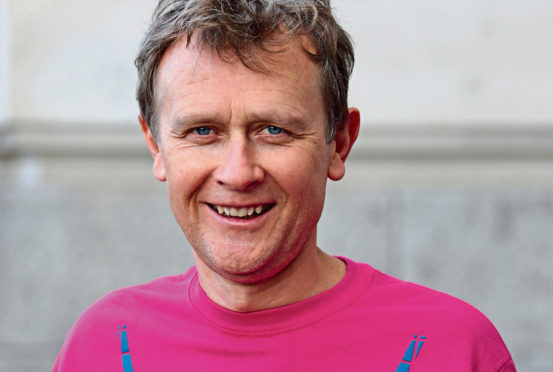
“Men get breast cancer, too” is still a sentence that surprises people.
That’s why it’s important to get the message out that men should check themselves as well.
David Aggett, a vet, was diagnosed with breast cancer in 2015, and in May 2017 he discovered the cancer had spread to his lungs.
“Just under four years ago, I found a tiny lump smaller than a pea under my right nipple after I got crushed and bruised by one of my patients, a dairy cow,” explains David, from Henstridge in Somerset.
“So began the rollercoaster year. First surgery, a mastectomy plus the lymph nodes removed from my armpit, then five months of chemotherapy, a month of radiotherapy and finally starting 10 years of hormone therapy.
“On the plus side, during chemo I didn’t have to shave for months – brilliant! And thanks to a Cold Cap I got to keep the hair on my head which meant I didn’t look quite so ill when collecting my children from school.
“I did have awful brain freeze and ice in my hair each time it came off but for me, it was definitely worth it.
“Then, just as I was beginning to get my life back on an even keel, my brother died following an aeroplane accident and that brought our world tumbling down.
“A few months later, when I thought I had no fight left in me, the breast cancer returned, this time in my lungs.
“From who knows where I found the resilience to pick myself up and face whatever was thrown at me – so back to square one, more surgery to remove parts of my lung and strip out lots of associated lymph nodes.
“This second operation made the first one look like a walk in the park. I woke up in intensive care with every sort of gadget and tube attached to all sorts of my anatomy.
“My wife Beth will never forget that day when in front of her, and with no warning, I crashed and went very blue.
“I vaguely remember watching the managed ‘panic’ of the doctors and nurses trying to keep me alive.
“I remember two other things – hallucinating on morphine, and being visited by an Australian physio who, on seeing the new scar on my back, exclaimed, ‘Looks like you have been bitten by a shark, David, albeit a very tidy one!’.
“Psychologically I have found the scar on my back easier to deal with than my mastectomy scar.
“At first, if I were in the pool or on a beach I would sling a towel over my shoulder to fall down my chest covering the scar.
“I guess for women it’s not so noticeable as they wear a bikini top or swimming costume with a prosthesis so it’s harder to notice. It doesn’t bother me so much now, though, it just took me a while to adjust.
“As I have secondary breast cancer and cannot be cured, I will remain on lifelong treatment.
“My new drugs are doing great things keeping the cancer quiet – for now.
“On the flip side, there are side effects of everything I have been through and continue to go through – poor immunity, brain fog, chronic fatigue, painful feet, hands and ribs, mouth ulcers, inflamed eyes, an arm that will always need protecting from even small cuts and scratches and so on which means I was medically retired at 47 years old.
“Now even my hairy chest is disappearing! Whatever next? But that’s enough complaining!
“At present, I am monitored on a monthly basis by a wonderful team at the Royal Marsden Hospital. I really feel secure in the knowledge that they will help me every step along the way.
“I now feel passionate about raising awareness of breast cancer in men and secondary breast cancer.
“Recently scruffy old me donned some ‘glitzy’ clothes and took part in a fashion show in London along with 31 other models with a diagnosis of breast cancer, for Breast Cancer Now.
“It was great fun and we helped raise a huge amount of money and awareness. Plus it was very refreshing to spend time with people who just ‘get’ what you’ve been through, no explanations needed.
“My message would be ‘Check Your Boobs’ – that includes all you men, too! It’s so simple to do. And enjoy yourself each and every day.”
Breast cancer charity Walk The Walk is encouraging people to download a “Check your Chest” poster they created.
The poster highlights the importance of men checking themselves for symptoms of breast cancer, leading to prevention and early detection.
Every year, 370 men are diagnosed with breast cancer in the UK and 81 men die.
Professor Stephen Johnston, Consultant Medical Oncologist and a Trustee of Walk The Walk, says: “Similar to breast cancer diagnosis in women, if detected early it is a very treatable and curable disease in men.
“Although rare, it is important to spread the word that men can get breast cancer, too, and should ‘Check their Chest’.”
For more information, or to sign up for The MoonWalk London 2020 which takes place on Saturday May 16, visit www.walkthewalk.org

Enjoy the convenience of having The Sunday Post delivered as a digital ePaper straight to your smartphone, tablet or computer.
Subscribe for only £5.49 a month and enjoy all the benefits of the printed paper as a digital replica.
Subscribe